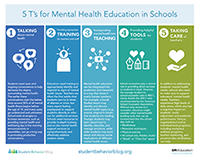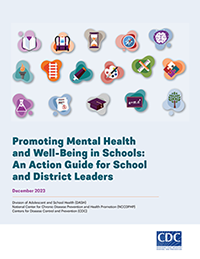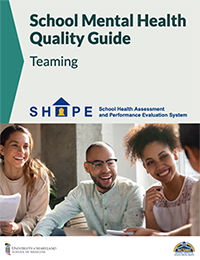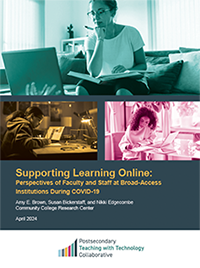|
SRI Education Update May 2024 |
|
|
|
|
|
|
 Since 1949, Mental Health Awareness Month has served as an opportunity to acknowledge the importance of mental health and wellness in Americans’ lives and advocate for individuals, families, caregivers, educators, and others who require or provide mental health support. This quarter’s newsletter includes a collection of evidence-backed guides and resources designed for school and district leaders, educators, researchers, and other interest holders who work to identify and address the mental health needs of learners at all stages of development, across all settings, and throughout every month the year. |
|
|
|
How Can We Incorporate Mental Health Education into Schools? Consider the 5 T’sSchools have a unique and critical role in supporting student mental health and well-being. This Student Behavior Blog article identifies 5 “T” strategies for states, districts, and schools to consider as their educators join the movement to promote and support student mental health. |
 |
|
|
|
PODCAST: Supporting Students with Emotional and Behavioral NeedsHow can teachers foster better classroom relationships and improve outcomes for students with emotional and behavioral needs? SRI Principal Education Researcher Carl Sumi joined The SRI Homeroom podcast to discuss effective strategies and evidence-based interventions being used to support students across educational stages and settings, from early childhood to high school. Sumi also discussed the value of evidence and the role researchers can play in providing actionable insights to educators. Listen to the episode, explore key takeaways, and access a transcript in this blog post. |
 |
|
|
|
Promoting Mental Health and Well-Being in Schools: An Action Guide for School and District LeadersThis Centers for Disease Control and Prevention (CDC) action guide provides six in-school strategies proven to promote and support mental health and well-being. It also offers approaches for putting those strategies into action and examples of evidence-based policies, programs, and practices. |
 |
|
|
|
2024 School Mental Health Quality GuidesThese revised 2024 School Mental Health Quality Guides, offered by the National Center for School Mental Health (NCSMH), are presented in an accessible format and contain detailed steps, best practices, examples from the field, and more. Topics include teaming; needs assessment and resource mapping; screening, Tier 1, 2, and 3 supports; funding and sustainability; and impact. |
 |
|
|
|
Research into Student Mental Health, Behavior, Social-Emotional Learning, and MoreSRI Education’s Student Behavior Research team partners with students, teachers, and administrators from preschool to postsecondary education to learn about what works to promote healthy and safe learning environments. The team’s research, supported by governmental agencies, states, foundations, and local communities, offers valuable insights into a broad range of programs and initiatives in districts and schools across the country. |
 |
|
|
|
Helping Early Childhood Educators Support Children’s Mental HealthIn some early childhood education (ECE) programs, challenging student behaviors can result in suspension or expulsion. In response, many states are working with educators to address these types of behaviors and children’s overall mental health without removal from school. Little is known, however, about the implementation of these new policies and supports within the complex landscape of state ECE systems. |
 |
|
Researchers from SRI Education and the National Center for Children in Poverty investigated the implementation and impacts of policy changes in Arkansas, gauging ECE program leaders’ and teachers’ understanding of the state’s expulsion prevention policy, their use of suspension and expulsion, and their participation in professional development and other supports to meet the needs of children with challenging behavior. Explore their findings in the following publications:
|
|
|
|
|
How the COVID-19 Pandemic and Machine Learning Delivered Insights Into Adolescent Mental HealthThis collaborative paper from SRI and the Adolescent Brain Cognitive Development (ABCD) Study offers important insights into the impact of the COVID-19 pandemic on adolescents, providing key takeaways regarding teen mental states and behaviors during stressful or traumatic events. |
 |
|
|
|
|
Online EducationTwo New Publications Highlight Practical Examples of SDL Skill Support in Online CoursesTo learn effectively in online courses, students benefit from developing attitudes, dispositions and learning skills – such as motivation, planning, help seeking, and reflection – referred to as self-directed learning (SDL) skills. The Postsecondary Teaching with Technology Collaborative – a partnership between SRI, the Community College Resource Center, Achieving the Dream, and nine postsecondary institutions – has released a new report and brief providing concrete examples of SDL skill support at community colleges and broad-access universities and highlighting practices relevant to STEM disciplines. Download both publications and explore key takeaways in the Postsecondary Teaching with Technology blog post. |
 |
|
|
|
REL AppalachiaHow Educators Can Engage Kinship Caregivers and GrandfamiliesDespite schools’ well-intended efforts to welcome families, they often overlook a growing part of school communities – kinship caregivers and grandfamilies. This blog post, written by Laura Kassner, Kayla Benson, and Megan Mikesell, describes the unique needs and dynamics of nontraditional families in Appalachia, offering practical strategies and resources centered on outreach, connection, and inclusion. |
 |
|
|
|
Product Development and ScalingNew ‘Stories of Scaling’ Series from the LEARN NetworkHow have researchers and entrepreneurs successfully designed, developed, and scaled new evidence-based products and strategies? Learn from the leaders of Cognitive Toybox, PictoWord School, and InqITS in the LEARN Network’s new Stories of Scaling series. |
 |
|
|
|
Early Childhood and Educational MediaYouTube’s ABCs and 123s: Describing the Quality of Early Literacy and Math Videos on YouTubeChildren’s video viewing has shifted from television to online streaming platforms like YouTube. While such platforms include many educational videos for children, we know little about the educational value of the content in these videos. SRI researchers Claire Christensen and Maddie Cincebeaux closely examined the quality, duration, and popularity of nearly 1,200 YouTube videos focused on early literacy and math topics. Their new paper shares their findings, providesx key takeaways regarding user-generated educational videos, and discusses implications for parents, content creators, and researchers. Learn more about their work in this SRI.com feature article, "SRI researchers watched over 1000 YouTube videos for kids, and this is what they learned." |
 |
|
|
|
Rural EducationDesigning and Scaling for Educational Impact in Rural Communities: Five Takeaways for Researchers and DevelopersThe LEARN Network recently hosted a panel discussion with scholars and practitioners from across the nation who understand the unique considerations required to design, research, and scale evidence-based products in and across rural communities. Watch the full panel discussion, download a transcript, and explore key takeaways for researchers and developers in this LEARN Network blog post. |
 |
|
|
|
Postsecondary TransitionsIntegrating Community Cultural Wealth Into Postsecondary Transition for Students With Disabilities Receiving English Learner ServicesIn this journal article from Remedial and Special Education, researchers apply Bourdieu’s capital theory alongside Yosso’s community cultural wealth framework to better understand how capital informed the postsecondary transition experiences of students receiving special education and English learner services and their parents. |
 |
|
|
|
Researcher ResourcesMastering Data Analysis: Unlocking the Potential of Pivot TablesAre you feeling overwhelmed by all the data you have on hand? Are you looking for an easy tool to help you begin analyzing your data? A new tutorial series from the DaSy Center offers guidance for using the pivot table, a powerful tool in Microsoft Excel that lets you quickly slice and dice your data in numerous ways. |
 |
|
|
|
College and Career ReadinessChanging Graduation Requirements for a Changing WorldWhat do high school graduates need to know and be able to do to be prepared for college and career? A new overview produced by researchers with the Region 4 Comprehensive Center captures high school graduation requirements from all 50 states and the District of Columbia. Learn more and discover key takeaways in this blog post written by Julie Harris for the Equitable Pathways to College and Career website. |
 |
The SRI Homeroom |
||
|
||
 |
 |
 |
|
|
|
|
|
|
|
|
|
SRI Education, a division of SRI International, is helping federal and state agencies, school districts, major foundations, nonprofit organizations, and international and commercial clients tackle some of the most complex issues in education to help students succeed. Our mission is to reduce barriers, optimize outcomes, and ensure educational equity for all children, youth, and families. We do this by conducting high-quality research, supporting use of data and evidence, helping to strengthen state and local systems, and developing tools that improve teaching and accelerate and deepen learning. Our work covers a range of topics: early learning and development, disability and inclusion, supporting multilingual learners, student behavior and well-being, teaching quality, digital learning, STEM and computer science, and literacy and language arts, and college and career pathways. We believe diversity in our organization and project teams leads to better and more equitable research and technical assistance, resulting in improved outcomes for all. SRI International is a nonprofit research institute whose innovations have created new industries, extraordinary marketplace value, and lasting benefits to society. |
|
|
|
|
|
© 2024 SRI International. |


